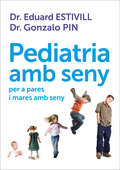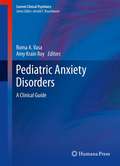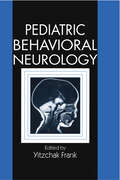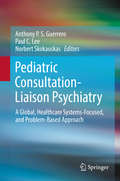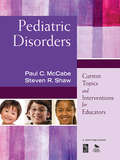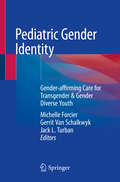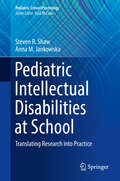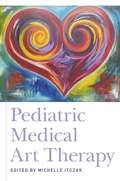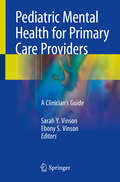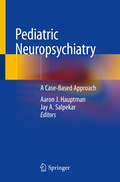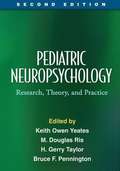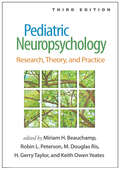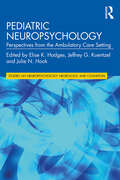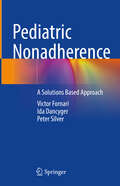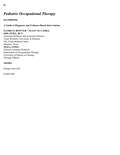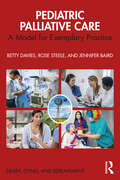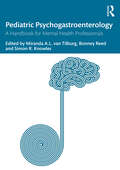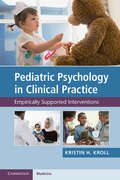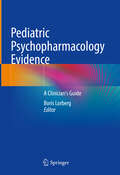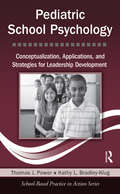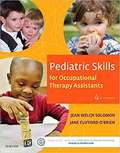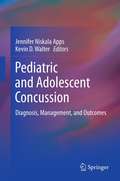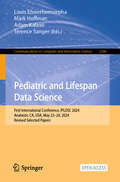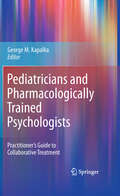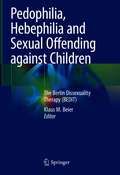- Table View
- List View
Pediatria amb seny per a pares amb seny
by Eduard Estivill Gonzalo PinCriar un fill és un repte bonic però difícil, perquè demana certes dosis de reflexos i recursos personals que no saprenen a cap escola.Aquest és un llibre diferent i innovador. Aquestes pàgines són les vostres companyes de viatge. Pediatria amb seny és una obra rigorosa, senzilla, directa i sobretot molt amena.Exposa cada etapa del creixement dels nens, lalimentació, el son, les seves actituds i els possibles problemes de salut. Per mitjà de la consulta de las fitxes que descriuen les malalties més freqüents, aprendreu quan cal visitar el pediatre.Aquest llibre també ajuda en temes fonamentals com els aspectes emocionals de leducació dels fills. Parla de lautoestima, els valors, la socialització adequada, el col·legi, la disciplina, leducació sexual, els jocs, les noves tecnologies, lecologia, els esports, els estudis i les activitats extraescolars.Pediatria amb seny, que reuneix tres libres en un (guia mèdica + guia educativa + fitxes i resums), és el millor suport que us podem oferir. Us ajudarà a ser més bons pares o cuidadors i, sobretot, a tenir un fill sa, físicament i mentalment. Tot això amb una bona dosi de seny.
Pediatric Anxiety Disorders: A Clinical Guide
by Amy Krain Roy Roma A. VasaOver the past decade, significant advances in research methodology have stimulated dramatic progress in the field of child psychiatry in general, and in pediatric anxiety disorders, more specifically. Pediatric Anxiety Disorders: A Clinical Guide is a comprehensive and vital addition to the literature at an exciting time in the field of psychiatry. This state-of-the-art reference aims to bridge the most up-to-date research findings with relevant clinical perspectives, making it a unique and essential resource for established clinicians and researchers, as well as for students and trainees. The book is organized into four sections, each of which includes chapters on a specific area of interest. The first section reviews the current research regarding etiological mechanisms of pediatric anxiety. The second section provides in-depth descriptions of the anxiety disorders that affect children and adolescents. The third section summarizes the literature on empirically supported assessment tools and evidence based cognitive-behavioral and pharmacological interventions. Of special practical note, the authors of these chapters have included comprehensive summary tables that can serve as quick reference tools. The final section of the text is dedicated to understanding how anxiety manifests in two special populations, children with chronic medical illnesses and those with autism spectrum disorders. Pediatric Anxiety Disorders: A Clinical Guide is an authoritative new volume developed by a renowned collection of clinicians and researchers in the field of childhood anxiety disorders.
Pediatric Behavioral Neurology
by Yitzchak FrankThis book assembles, for the first time, information required for the recognition, understanding, and treatment of behavioral problems resulting from neurological conditions. Its focus is two-pronged: 1) on conditions where cognitive-behavioral manifestations are major symptoms, such as attention deficit hyperactivity disorder, autism, and developmental language disorder; and 2) on conditions where these symptoms are significant but secondary, such as brain tumors, epilepsy, and AIDS. This multi-authored guide also outlines effective approaches to behavioral therapy for these conditions. Pediatric Behavioral Neurology is an excellent resource for practitioners whose work demands knowledge of the symptoms, signs, and treatment of behavioral and cognitive disorders caused by brain abnormalities. It is comprehensive, yet concise and easy to use.
Pediatric Consultation-Liaison Psychiatry: A Global, Healthcare Systems-Focused, and Problem-Based Approach
by Anthony P. Guerrero Paul C. Lee Norbert SkokauskasThis ambitious resource presents an inventive approach to integrating pediatric and mental health care based in comprehensive, family-centered service delivery. Its framework adds a problem-solving focus to the core principles of pediatric consultation-liaison psychiatry, emphasizing young patients’ developmental, family, and social context. An international panel of expert clinicians explores the value of the mental health component in treating complex and chronic cases across varied settings, as well as practical considerations in implementing collaborative pediatric care systemwide, including at the global level. Detailed case histories illustrate skills and traits essential to making this problem-based approach work, such as multidimensional thinking, a prevention mentality, a dedication to lifelong learning, and empathy and respect for young clients and their families. Included in the coverage: · Pediatric medicine for the child psychiatrist. · Safety issues in a general medical facility setting. · “Other medical” presentations and considerations in pediatric consultation-liaison psychiatry. · Principles of biopsychosocial formulation and interventions in the pediatric medical setting. · Preventive models for reducing major causes of morbidity and mortality in childhood. Child and adolescent psychiatrists, child and school psychologists, and physicians in pediatrics, general practice, and family medicine will welcome Pediatric Consultation-Liaison Psychiatry as both a robust training text and a blueprint for the future of children’s medicine.
Pediatric Disorders: Current Topics and Interventions for Educators
by Steven R. Shaw Dr Paul C. McCabeThe educator’s go-to reference for important pediatric health topics! Based on up-to-date research, this volume outlines the most current and urgent pediatric issues affecting schools today. Written for school psychologists, counselors, administrators, and teachers, this easy-to-understand resource covers: <p><p> Schools as partners in health care delivery, including health care delivery trends and collaborations between educators and medical professionals <p> Current issues in pediatric disorders and treatments, such as childhood immunizations, shaken baby syndrome, sleep problems, and pediatric HIV <p> Prevention and wellness intervention for childhood obesity, low-level aggression in the schools, and accident prevention
Pediatric Gender Identity: Gender-affirming Care for Transgender & Gender Diverse Youth
by Michelle Forcier Gerrit Van Schalkwyk Jack L. TurbanThis book serves as a guide to key topics regarding pediatric gender identity to help clinicians better care for transgender and gender diverse youth. Written by experts in the field, it covers critical considerations for child health providers from a variety of disciplines in a range of clinical settings. Patients, families and other community agencies can also find useful information about current practices and recommendations for care and support. The text begins by overviewing terminology, epidemiology, gender identity development, and relevant neurobiology. Next, the text focuses on the emergence of affirmative treatment paradigms using a patient-centered, consent based framework. Topics include psychotherapeutic support, gender-affirming medical and surgical care, management of co-existing psychiatric conditions, sexual health and fertility, legal considerations, international considerations, and more. Pediatric Gender Identity can be used as a framework to address core clinical issues and offers practical considerations for gender-affirming care. Using the growing science and understanding of gender development, this book is an excellent resource for all professionals working with gender diverse youth, including child and adolescent psychiatrists, pediatricians, pediatric surgeons, psychologists, therapists, researchers, school and educational leaders, and students.
Pediatric Intellectual Disabilities at School: Translating Research into Practice (Pediatric School Psychology)
by Steven R. Shaw Anna M. JankowskaThis book synthesizes the most current evidence-based research and practices on prevention, assessment, intervention, and treatment of pediatric intellectual developmental disabilities. It provides a broad empirical framework for innovative practices and discusses their possible impact on children’s future development, ability to learn, social skills, and quality of life. The book highlights important findings in cognitive and behavioral development for children with such disorders as 22q13 Deletion syndrome (i.e., Phelan McDermid syndrome), Prader-Willi syndrome, Williams syndrome, and sex chromosome disorders (e.g., Klinefelter syndrome) – children often considered untestable, unteachable, and unknowable. In addition, the book includes case studies that emphasize a team approach with physicians, families, school psychologists, and teachers for providing quality research-based psychological, educational, and mental health services. Topics featured in this book include:Up-to-date findings on the causes and symptoms of intellectual disability disorders.Common medical treatments for children with intellectual disabilities.Therapeutic interventions for children with intellectual disabilities.Psychoeducational assessment practices for children requiring special education assistance.Future directions to support people with intellectual disabilities. Pediatric Intellectual Disabilities at School is a must-have resource for researchers, graduate students, and other professionals in child and school psychology, psychiatry, social work, special and general education, public health, and counseling.
Pediatric Medical Art Therapy
by Tracy Councill Kayleigh Orr Andrea Davis Nana Zhvitiashvili Julie Gant Anna Moore Megan Belcher Abbien Crowley Ciucci Josephine Mahoney Aimee O'Neill Kristen CatchpoleArt therapists have an essential part to play in supporting children and their families when a child is undergoing medical treatment. The art therapists who contribute to this book offer their experience of working in medical environments and creating hospital art therapy programs for working with children and young people. Readers will find interventions and techniques, along with program development ideas and diverse approaches to work with patients. Chapters also cover different diagnoses and areas of healthcare, such as oncology, chronic illness and burns. The challenges and opportunities for art therapy in working with terminal illness and bereavement are also addressed. Pediatric Medical Art Therapy delineates the essential considerations and lessons for the art therapist who joins the medical journeys of children and their families, and emphasises the importance of this unique role.
Pediatric Mental Health for Primary Care Providers: A Clinician's Guide
by Sarah Y. Vinson Ebony S. VinsonThe purpose of this book is to provide a children’s mental health resource tailored to the needs of physicians working with children. There are currently no such texts, despite the fact that there are patient care, healthcare systems, and workforce factors that indicate a strong need for such a resource. Approximately 1 in 5 children are diagnosed with a mental illness by the age of 18. Additionally, mental health conditions, including Attention Deficit Hyperactivity Disorder, are consistently among the most common chronic conditions in pediatric clinical populations. Delays in both diagnosis and treatment increase the morbidity associated with these conditions. These delays expose the child to negative ramifications of his/her illness and can impact rates of poor academic performance, substance use disorders and criminal justice system involvement – potentially impacting long-term life trajectories. Early identification of mental illness and appropriate intervention is critical to the healthy development of youth, though physicians in primary care and pediatrics are seldom trained to detect and treat such illnesses. The importance of recognizing mental illness is reflected in practice guidelines for pediatric primary care providers as well as in how service delivery is being structured, but this does not offer in-depth clinical guidelines. Additionally, integrated care and medical home models include mental health as key components, though yet again physicians are often not trained to work with these models. While clearly indicated clinically, these requirements do not come with significant increases in reimbursement and are added to an already demanding schedule. Increasingly, providers are also expected to use evidence based screening instruments without exposure to this body of literature. Some guidance on using those instruments in context will help them to use those tools more effectively. Finally, primary care providers and even some adult psychiatrists and psychologists are operating in a healthcare system with a severe, nationwide shortage of child and adolescent psychiatrists and mental healthcare providers. While a text certainly cannot single-handedly compensate for such a workforce shortage, it could potentially help to mitigate the negative impact on patients by facilitating early identification and treatment in the primary care setting. Additionally, with more effective treatment in pediatric settings, less complex cases may be addressed before specialty care is needed, and the expertise of child and adolescent psychiatrists can be more effectively used for more complex cases.Pediatric Psychiatry in Primary Care is the ultimate resource for clinicians working with children, including pediatricians, family physicians, general psychiatrists, psychologists, early career child psychiatrists, social workers, nurses, school counselors, and all clinical professionals who may encounter children struggling with psychiatric disorders.
Pediatric Neuropsychiatry: A Case-Based Approach
by Aaron J. Hauptman Jay A. SalpekarAdult neuropsychiatry is now a well-established field with numerous reputable references. Practitioners who work with children routinely note how references and practitioners knowledgeable in the equivalent work in the pediatric world are rare. Child psychiatrists and neurologists frequently work with individuals struggling with these conditions and would strongly benefit from such a reference that incorporates medical work-up, psychopharmacological recommendations, family/support recommendations and theoretical pathophysiology. Pediatricians and developmental pediatricians often treat children with behavioral and neuropsychiatric sequelae, but are not well-trained in the neuropsychiatric management of these cases. Neuropsychologists and educational psychologists working with children and adults with pediatric-onset conditions will also find the text helpful to contextualize their cases, better-understand the medical evaluation and management and perhaps adjust recommendations that would supplement their own testing methods. Finally, sub-specialists in adult neurology, psychiatry and neuropsychiatry often find themselves working with these children by default as there are few pediatric subspecialists who are available to accept them into practice. When facing complex neuropsychiatric illness in children, many clinicians are stymied because they may have “never seen a case like that”. This text fills the wide gap that currently exists and helps move this field forward. The approach utilized in adult neuropsychiatry that is both clear and accessible does not yet have an equivalent in the pediatric realm, but there is tremendous interest in its development. Children and adolescents with neuropsychiatric conditions are very common and they and their caregivers often struggle to find professionals well educated in this field. Ultimately, a wide range of clinicians will find this text to be a very helpful resource for diagnosis and management in the spectrum of pediatric neuropsychiatric conditions. The case-based approach is also unique with respect to neuropsychiatric approaches, and the clear cut, reader-friendly approach of such a format would likely be well-received among physicians looking for a resource on this issue.
Pediatric Neuropsychology, Second Edition
by Keith Yeates M. RisThe most comprehensive, authoritative reference of its kind, this acclaimed work examines a wide range of acquired, congenital, and developmental brain disorders and their impact on children\u2019s neuropsychological functioning. Leading experts present state-of-the-art knowledge about how each condition affects the developing brain; the nature and severity of associated cognitive, behavioral, and psychosocial impairments; and effective approaches to clinical evaluation and treatment planning. New to This Edition Reflects significant scientific advances. An additional coeditor, Bruce F. Pennington. Chapters on math, reading, and language disabilities; attention-deficit/hyperactivity disorder; autism; and intellectual disabilities. Medical disorders not covered in prior edition acute disseminated encephalomyelitis and multiple sclerosis; tuberous sclerosis; childhood stroke; and fetal alcohol syndrome. A chapter on evidence-based neuropsychological interventions.
Pediatric Neuropsychology, Third Edition: Research, Theory, and Practice
by Miriam H. Beauchamp, Robin L. Peterson, M. Douglas Ris, H. Gerry Taylor and Keith Owen YeatesRecognized as the definitive reference and text on the relationship between brain health and behavior in children and adolescents, this volume is now in a third edition with 75% new material, including major updates throughout and numerous new chapters. Leading experts provide a neuropsychological perspective on medical, neurological, genetic, and developmental disorders that are frequently seen in clinical practice. The volume examines the impact of each condition on the developing brain; explores associated cognitive, behavioral, and psychosocial impairments; and shows how the science translates into achieving better outcomes for children. New to This Edition *Reflects 12 years of significant research advances and the expanding role of pediatric neuropsychologists; increased attention to evidence-based intervention throughout. *Chapters on additional medical and neurodevelopmental conditions: pediatric stroke, congenital heart disease, type 1 diabetes, and movement disorders. *Section on genetic disorders: fragile X, Williams syndrome, 22q11.2 deletion syndrome, and Down syndrome. *Section on emergent and controversial conditions: nonverbal learning disabilities, dysexecutive syndrome, pediatric acute-onset neuropsychiatric syndrome, and sluggish cognitive tempo.
Pediatric Neuropsychology: Perspectives from the Ambulatory Care Setting (Studies on Neuropsychology, Neurology and Cognition)
by Elise K. Hodges Jeffrey G. Kuentzel Julie N. HookPediatric Neuropsychology: Perspectives in an Ambulatory Care Setting provides an overview of the most commonly seen disorders in outpatient settings including ADHD, Autism, congenital heart disease, blood cancer and hematologic conditions, brain tumors, and epilepsy. Each chapter provides up-to-date information on these pediatric neurodevelopmental and medical disorders, including a review of the neuroanatomic contributions as well as an overview of the neuropsychological findings. Alongside the neuroanatomic and neuropsychological underpinnings, case examples and intervention recommendations are provided for parents, educators and others who work with these populations, to enhance the ecological validity of neuropsychological assessments. With reference to the latest diagnostic criteria, this book is an invaluable resource for neuropsychologists or neuropsychology students whose work includes pediatric patients with neurodevelopmental and neuro medical disorders. It is designed to provide practical information but also the most up to date research in neurobiological and neuroanatomical contributions of these disorders to inform the practitioner and enhance the care provided to their pediatric patients.
Pediatric Nonadherence: A Solutions Based Approach
by Peter Silver Victor Fornari Ida DancygerNonadherence to pediatric recommendations is a pervasive challenge to the growth, development, and wellbeing of children. Nearly half of all youth and their parents suffer the consequences of misunderstanding, forgetting, ignoring or refusing professional medical advice regarding children. Addressing this widespread dilemma, this unique and comprehensive title explores a variety of different pediatric problems that impact children, adolescents and their families. Clinical case vignettes are provided to highlight particular considerations, and a description of the most up-to-date strategies to solve the dilemma of nonadherence to pediatric care is provided. Indeed, technology is emphasized as an important and innovative means of tracking, interfacing and gathering individual data and facilitating improved pediatric adherence. No one intervention strategy can be applied to solve nonadherence of pediatric patients. Research studies have concluded that successful efforts to enhance adherence rely on a number of important elements. First and foremost is nurturing a trusting relationship between the patient, the family and the clinician, which strengthens the therapeutic alliance. Following that is making sure that the patient and family fully understand the nature of the illness and the recommendations. Effective and clear communication is critical between the health professionals, the patient and the family. When the health professional understands who the patient and the family are on a deeper level, then adherence may be improved. It is imperative that the clinicians take into account the individual patient and families’ cultural, social and community context, as well as their beliefs and support systems. An atmosphere of shared collaboration and mutual respect will improve open communication and the promotion of adherence and positive outcomes. An important thread throughout each chapter is the impact of health care disparities, diversity and equity. The contributors to Pediatric Nonadherence represent a wide range of nationally and internationally recognized experts in their area of pediatric sub-specialization and practice. A major contribution to the clinical literature, this timely title will be of great interest to pediatricians, family practitioners, medical students, residents, fellows, physician assistants, and nurse practitioners.
Pediatric Occupational Therapy Handbook: A Guide to Diagnoses and Evidence-based Interventions
by Patricia Bowyer Susan M. CahillCombining essential assessment guidance with the latest evidence-based intervention strategies, this compact reference helps you quickly locate the information you need to evaluate and manage pediatric disorders. <p><p>Access diagnosis-specific information on epidemiology, precautions, and more, as well as suggested interventions supported by the latest research, all in a convenient, pocket-sized handbook perfect for the busy clinical setting. Information is presented in a consistent format for easy reference and complies with the OT Practice Framework to help you ensure the most effective therapeutic outcomes.
Pediatric Palliative Care: A Model for Exemplary Practice (Series in Death, Dying, and Bereavement)
by Jennifer Baird Betty Davies Rose SteelePediatric Palliative Care: A Model for Exemplary Practice lays out a road map for health-care providers interested in optimizing care for seriously ill children and their families. Grounded in clinical practice and the study of positive rather than problematic encounters between providers and parents, the book presents an evidence-based model of exemplary interaction. The chapters offer a clear understanding of the complex, holistic process of interaction between providers and parents, as well as the personal and professional knowledge and skills needed to interact in optimal ways. This is a one-of-a-kind guidebook for health-care providers interested in (re)discovering how to maximize positive outcomes for both families and providers. It is also a valuable source of inspiration for educators, supervisors, and hospital administrators who want to facilitate personal and professional development and create supportive environments for students, providers, seriously ill children, and their families.
Pediatric Psychogastroenterology: A Handbook for Mental Health Professionals
by Miranda A.L. van Tilburg, Bonney Reed and Simon R. KnowlesBringing together international experts in psychological and behavioural treatments for pediatric gastrointestinal symptoms, this book provides detailed, evidence-based protocols targeting gastrointestinal distress and associated mental health concerns for patients and their families. The first consolidated resource on the topic, Pediatric Psychogastroenterology gives mental health professionals access to the most up to date clinical knowledge and practice. Taking a holistic approach, it guides the reader on the treatment and care of pediatric gastrointestinal patients, as well as how to work with and support children’s parents and families. The book is structured around symptom presentation and common challenges, enabling the reader to focus quickly on the area of need. Each chapter includes clinical pearls of wisdom and 62 developmentally appropriate worksheets for patients and their families to facilitate treatment, available for download. This practical, authoritative guide is an essential resource for mental health professionals who work directly with pediatric cohorts, as well as postgraduate students in health psychology, behavioral medicine, or social work.
Pediatric Psychology in Clinical Practice: Empirically Supported Interventions
by Kristin H. KrollThis book serves as a practical guide for mental health practitioners working with children and adolescents with chronic medical concerns. It provides key information on current research and the theoretical foundations underlying many evidence-based assessments and interventions. Based on the current literature, readers are given empirically grounded practical guidance on how to assess patients, implement key clinical interventions, and navigate clinical dilemmas that may arise in different situations. The book covers common issues specific to working with young children, school aged-children, and adolescents, as well as particular medical conditions, and how to conceptualize and treat these concerns. Reproducible worksheets are provided to help clinicians apply what they learn to their clinical practice and to better manage common challenges. This readable book will be an invaluable introduction to the junior clinician, as well as a handy resource for the experienced practitioner, who can refer to relevant sections as specific problems arise.
Pediatric Psychopharmacology Evidence: A Clinician's Guide
by Boris LorbergThis book is a comprehensive guide to pediatric psychopharmacology, detailing medications used to treat a wide variety of childhood and adolescent mental illnesses. Childhood and adolescence represent critically important life stages in cognitive, social, and emotional development. Unfortunately, the prevalence of mental illness has been growing over the last several decades, especially among children. It is estimated that suicide is the second most common cause of death among adolescents and young adults in the United States. A crucial component of evidence-based mental health treatment of youth consists of careful, sophisticated, and compassionate medication treatment. This guide is divided into 18 chapters, with most covering the medications used to treat a specific disorder or group of disorders. Chapters comprehensively cover each medication’s history, FDA indication status and context, representation in the media, mechanism, extent of usage and research, and quality of evidence supporting its efficacy and safety. Chapters also cover approaches clinicians can use to discuss medications with patients—including alternative treatment options and integrating patient-level variables when choosing a medication. This book focuses on understanding patient and family perspectives on medication with suggested clinician responses to better communicate about prescription management. Chapters also include tables and figures, list resources and guidelines, and discuss controversies in the media. All prescribers to children and adolescents will find Pediatric Psychopharmacology Evidence to be a timely, comprehensive, and compassionate guide to the pharmacological treatment of young patients with mental illness.
Pediatric School Psychology: Conceptualization, Applications, and Strategies for Leadership Development (School-Based Practice in Action)
by Thomas J. Power Kathy L. Bradley-KlugIn today’s schools, it is imperative that school-based mental health professionals be adequately trained in the knowledge and impact of pediatric health disorders on children’s academic, social, and emotional progress and performance. This book will provide practitioners and researchers with the most relevant and up-to-date information concerning conceptual models and applications of intervention and prevention strategies in pediatric school psychology. Rather than making specific disorders the book’s primary focus, the authors discuss practical topics such as improving adherence, promoting successful school reintegration, reducing stress and enhancing coping skills, improving pain management, and enhancing quality of life. Prevention strategies covered include developing multi-tiered programs, monitoring program effectiveness and quality of implementation, and programming for sustainability. A unique feature of this book is its emphasis on developing leaders in pediatric school psychology, with chapters devoted to important topics including program development and evaluation, grant writing, and manuscript reviewing and preparation. An accompanying CD contains PowerPoint presentations and guidelines for practice to assist with lectures and describes strategies for application in clinical and school settings.
Pediatric Skills for Occupational Therapy Assistants
by Jane Clifford O'Brien Jean W. SolomonLearn to provide effective therapy for children and adolescents with Pediatric Skills for Occupational Therapy Assistants, 4th Edition. This market-leading text offers a comprehensive, application-focused guide to pediatric occupational therapy assisting by incorporating the AOTA Practice Framework. The text’s focused and easy-to-use approach to pediatrics covers everything from the scope of practice to in-depth coverage of normal development, pediatric health conditions, and treatment planning. This new edition has also been thoroughly updated and expanded to include new content and chapters on community systems, physical agent modalities, the Model of Human Occupation assessments, childhood obesity, documentation, neurodevelopmental treatment, and concepts of elongation.
Pediatric and Adolescent Concussion
by Jennifer Niskala Apps Kevin D. WalterBetween the growing numbers of children and adolescents playing sports and the increased attention to head injuries by the larger sports community and the general public, pediatric concussions are emerging as a major concern. And as practitioners are seeing more young clients with head injuries, questions arise about age-appropriate assessment, diagnosis, treatment, and return to activity. Pediatric and Adolescent Concussion: Diagnosis, Management, and Outcomes offers evidence-based guidelines where few previously existed. This comprehensive volume clearly explains the effects of traumatic injury on the developing brain in sports- and non-sports-related contexts, and establishes a framework for immediate and long-term management, especially the crucial first 24 hours. Chapters provide a basic grounding in its subject with a history of concussion as a medical entity and a review of definitional and classification issues, take the reader through the steps of a neuropsychological evaluation, pinpoint post-injury issues, and offer strategies for the prevention of further or future injury. Pediatric and Adolescent Concussion: Diagnosis, Management, and Outcomes serves as both educational resource and practical framework for a wide array of professionals, including neuropsychologists, sports medicine physicians, child psychologists and psychiatrists, pediatric and family physicians, athletic trainers, social workers, and educators.
Pediatric and Lifespan Data Science: First International Conference, IPLDSC 2024, Anaheim, CA, USA, May 23–24, 2024, Revised Selected Papers (Communications in Computer and Information Science #2386)
by Mark Hoffman Louis Ehwerhemuepha Adam Kalawi Terence SangerThis open access book will address the unique requirements and technological tools for analysis of data across the lifespan, from childhood through advanced age. Topics such as sepsis, hospital-acquired infections, mental health, health equity, precision medicine, large language models and generative artificial intelligence, computer vision, ethical use of artificial intelligence, and large real-world electronic health record databases will be covered.
Pediatricians and Pharmacologically Trained Psychologists
by George M. KapalkaMany factors affect treatment options for children and adolescents with mental health problems, including age, severity of symptoms, financial and time constraints, and access to qualified professionals. With the limitations of managed care plans and the shrinking pool of pediatric psychiatrists, the trend is toward pediatricians prescribing psychotropic medicines. Pharmacologically trained psychologists can offer valuable assistance to pediatricians caught in this predicament. Tackling fundamental questions of when to treat as well as when and why to refer young patients, Pediatricians and Pharmacologically Trained Psychologists examines commonly occurring pediatric conditions requiring joint treatment; reviews theoretical models of consultation and collaboration; and spotlights professional issues typically arising from these team efforts. With pertinent clarity and detail, this volume offers in-depth discussion in these key areas:Collaborative treatment of mental health conditions, including mood, disruptive, anxiety, and eating disorders. Collaborative treatment of medical conditions, focusing on gastrointestinal disorders and diabetes. Changing clinical procedures in states that have enacted prescriptive authority for psychologists. Expanding roles for pharmacologically trained psychologists practicing in states that have not enacted prescriptive authority for psychologists. Medical psychology in the pediatric hospital. Integrative care in rural settings and on the reservation. The collaborative future: brain marker technology, training paradigms, and more. Pediatricians and Pharmacologically Trained Psychologists is a must-have reference for a broad range of researchers, professionals, and graduate students, including psychologists, pediatricians and other child mental health clinicians as well as nonphysician prescribers, such as nurses, physician assistants, and pharmacists.
Pedophilia, Hebephilia and Sexual Offending against Children: The Berlin Dissexuality Therapy (BEDIT)
by Klaus M. BeierThis book provides extensive information on pedophilia (sexual interest in the prepubescent body age), hebephilia (sexual interest in the early-pubescent body age) and sexual offenses against children, i.e., the various forms of child sexual abuse, including the use of child sexual abuse images, along with the current state of knowledge concerning offender groups. The book makes it clear that pedophilia or hebephilia do not inevitably lead to offenses against children – that there are those who keep their desires in their fantasies and do not act them out on the behavioral level. The World Health Organization classifies pedophilia as a mental disorder. It can be safely assumed that many pedophile men in a given community live their lives, unrecognized and adamant about hiding their sexual drives from society and from themselves, and who are genuinely motivated not to act upon their sexual fantasies. The numbers of exactly this particular group of pedophilically inclined non-offenders can be increased by preventive therapeutic measures. For this purpose, two treatment programs have been developed at the Institute of Sexology and Sexual Medicine at the Charité-Universitätsmedizin Berlin (University Clinic) since the initiation of the Prevention Project Dunkelfeld in 2005 – First, the project involving adult participants (Berlin Dissexuality Therapy: BEDIT) and later, another for adolescents (BEDIT-A), who find themselves attracted to children. Both program manuals are completely integrated into this work, which reflects 15 years of assessment and treatment experience.
